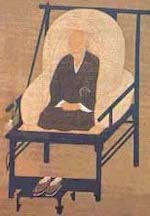Koso Wasan 61
In order to guide sentient beings
Even though they commit evil all their lives,
Amida urges them to 'say the Name,'
Vowing not to attain Buddhahood 'if they are not born.'
Accepting the Gift

This is the last verse of the Koso Wasan, which is dedicated to Tao-Ch'o.
Before we go on, I ought to point out that Shotoku Taishi, the great Prince Regent of Japan - a strong advocate of both Buddhist and Confucian principles for his country - was a near contemporary of Tao-ch'o. This is a rather remarkable fact, because Shotoku exemplifies the lay focus of the Mahayana, and it is this lay emphasis that was of greatest interest to Tao-ch'o.
Those who summarise Tao-ch'o's legacy always remind us that he was the thinker, who stood at the fork in the road where we confront a clear choice in the path we ought to follow. The path of sages heads off in one direction and the Pure Land way in another. Both lead to nirvana, but Tao-ch'o asks us to consider which is most likely to deliver us to the goal. He has no doubt in his own mind that there is really only one option: the Pure Land way. He has come to this conclusion after reflecting upon four elements that - together - form the basis of his choice. The first element is whether or not we live in the Age of Mappo. Tao-ch'o thinks we do. The second is whether - following from this - T'an-luan's assessment of the authority of teachers - and the reliability of the ways in which the Buddha-dharma is being presented - has undermined the reliability of what is being handed down to us. Tao-ch'o thinks the risks are too great. Thirdly, Tao-ch'o has become conscious that his own frailty serves to undermine his spiritual progress. Finally, Tao-ch'o found, from the sutras, ample evidence that the passage of time has brought the inexorable dawning of the age of the decaying dharma.
For these reasons, the choice of the Pure Land way is necessarily unequivocal. In Tao-ch'o we meet the first dharma master in recorded history who identifies utterly as a follower of the Pure Land way. He follows no other way and - in my view - given the basis for his decision, neither should we. Tao-ch'o stands, for me, as the rock upon which the Pure Land way is built. He is the one who inherited and embodied the teachings of the dharma masters that had gone before him and he is the teacher upon whose ideas the structure of the Pure Land way was to blossom. It is true that Shan-tao (who was Tao-ch'o's pupil) was probably the most consummate Pure Land master, but it is hard to imagine his accomplishments without Tao-ch'o.
Of all the new directions over which Tao-ch'o presided, however, none is more significant than the way in which he identifies the Pure Land way with ordinary people - the prthagjana (bombu). It seems clear to me that, although he was a monk, Tao-ch'o identified himself as a bombu. In this, we see a demonstration of compassion that is true to its meaning within the context of the dharma. Tao-ch'o is a bombu: he has become an ordinary person, Mr Everyman. He is also able to show in his writing that the Primal Vow is intended to reach to and save even the most depraved among us - without any qualification of any kind whatever.
The guarantee of this can be identified in the spirit of the verbal expression of the Primal Vow. The relevant Vows in the Larger Sutra include the phrase 'if they should not..., then I will not.' In the case of the eighteenth Vow it is 'if any should not be born, then I (Amida Buddha) will not attain enlightenment.' Amida Buddha, as dharma body of suchness, is the eternally enlightened Buddha. As Shinran says in the Jodo Wasan, Amida Buddha is 'older than the many mote-dot kalpas'. That is to say, he is the Buddha of primordial provenance - having been a Buddha from the time before anything else can be known. In any case, in the Larger Sutra, Ananda asks Shakyamuni if Amida has gained Enlightenment. Shakyamuni replies that indeed he has, and that he dwells in Sukhavati.
Since Amida Buddha is enlightened from vast æons and, at the same time, his enlightenment depends on our birth in the Pure Land, it goes without saying that our birth is assured. There is, however, one small detail. It is this.
Other Power shinjin (Sk. prasanna citta) requires, as all gifts do, that we accept it. A gift is not given and a grace is not conferred unless it is accepted by the one for whom it is intended. The gift of Amida Buddha's shinjin is intended for each of us as a unique individual; but we must actually accept it before its virtue can be appropriated. The way the gift is received is in Namo Amida Butsu, just as a monk receiving dana utters words of blessing (in China, this is 'O-mito fo', 'Amida Buddha') upon the giver.
Amida Buddha's gift is boundless and unhindered, offered all the time - to all. It remains for us to accept it for ourselves because, unless we do, the giving is incomplete. I think that Tao-ch'o's life of nembutsu - his life of devotion - was an endless act of acceptance; and so it is for us. For Tao-ch'o it is a gift that is always offered; and evermore received.